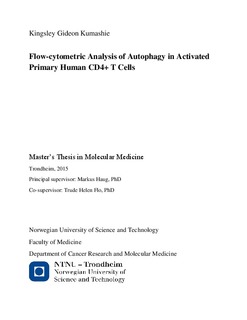| dc.description.abstract | The hallmark of an immune response to Mycobacterium tuberculosis is granuloma formation. CD4+Th1 cells are of central importance in anti-mycobacterial immunity by way of producing effector IFN-γ and TNF-α cytokines that help to contain infection in the granulomas by activating macrophages. The environment of the granuloma is hypoxic and we have little knowledge on CD4+ T cell processes and function in this environment. Autophagy is a de novo intracellular protein and organelle degradation pathway induced in eukaryotic cells by stress-factors such as starvation or hypoxia. It has been described that autophagy is induced in T cells upon activation and autophagic processes might contribute to nutrient supply and the regulation of cytokine production in T cells. The aim of this study was to investigate autophagic processes in CD4+ T cells after activation and the regulation of IFN-γ production under normoxia, and hypoxia as found in the granuloma of TB patients.
The main assays, immunoblotting and confocal microscopy that are currently used to study autophagy, have the limitation of not easily allowing analysis of autophagy on different T cell subsets in a heterogeneous cell sample. In this study, autophagy was quantified in different subsets of CD4+ T cells by a flow-cytometric method using a novel fluorescent probe, the CytoID autophagy detection kit. The findings of the flow-cytometric method were validated by LC3 immunoblotting and then used to study different aspects of T cell activation on autophagy in primary human CD4+ T cells. In this regard, we have shown that the flow-cytometric method of autophagy analysis can be combined with fluorescent surface marker staining but not intracellular staining for effector cytokines. We have also demonstrated that TCR stimulation without co-stimulation induces autophagy in primary human CD4+ T cell. Further, we found increased autophagy in CD4+ T cell subsets expressing the activation marker CD25+ 48 and 72 h post activation and CD4+CD25+T cells were found to be the main producers of effector Th1 cytokines, providing indirect evidence that autophagy might be increased in cytokine-producing CD4+ effector T cells. Finally we have successfully established a novel way of quantifying autophagy in effector cytokine specific T cells using a fluorescent cytokine catch reagent independent of intracellular cytokine staining. Using this method we have shown that autophagy is strongly induced in cytokine (IFN-γ) producing CD4+ T cells. In addition, we have shown that hypoxia did not induce autophagy in unstimulated primary human CD4+ T cells. In contrast, autophagy,
iii
surface activation marker and effector cytokine production were strongly upregulated in activated T cells under hypoxic conditions. All experiments in this study were performed with polyclonally activated CD4+ T cells. Therefore, we have developed an assay to expand mycobacteria-specific CD4+ T cell from healthy human donors in order to allow for future analysis of autophagy in antigen-specific CD4+ T cells.
The assays developed in this study may provide valuable tools in elucidating autophagy and effector Th1 cytokine regulation in antigen-specific T cells under different conditions such as hypoxia as seen in vivo in the granuloma of TB patients. | nb_NO |
